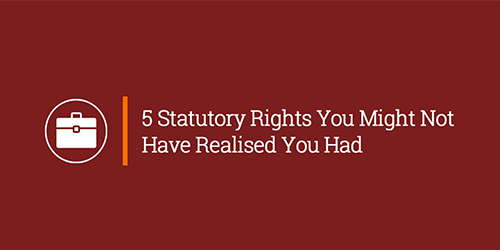5 Statutory Rights You Might Not Have Realised You Had
If you work in the UK and are not an agency or freelance worker, a casual worker, a trainee or self-employed, then you are entitled to certain rights in the workplace. Statutory rights are passed by Parliament to ensure that the workplace is safe and so that the work-life of employees is fair. It is the responsibility of every employer to make certain that these rights are made easily available to all of their employees.

Receiving the national minimum wage, being allowed annual leave and taking daily rest breaks; some of the rights you have at work are so commonplace that you may not have even recognized that they are legally protected. But what about the workplace rights we don’t hear so much about? Here are five statutory rights that you might not have realised you have:
The right to take time off for trade union activities and have a trade union representative accompany you in disciplinary or grievance hearings
All employees have the right to join a trade union if they should wish to and should not be discriminated against in any way because of membership to such an organisation. As long as the time off is pre-arranged with their employer and they do not expect to be paid for time missed, employees have the right to take time off work for duties and activities associated with the trade union they belong to.
The right to paid adoption leave
With exceptions to adopting privately, adopting a stepchild or becoming a special guardian or kinship carer, employees are entitled to take up to 52 weeks of leave to adopt a child. Employees can also receive Statutory Adoption Pay as long as they give the correct notice and have worked for the employer continuously for at least 26 weeks.
The right to written reasons for dismissal
When an individual’s employment is ended, they have the right to request and receive a written statement detailing the reasons for their dismissal from their employer. If you have completed two years of employment, or one year if your contract began before 6 April 2012, then your employer must provide you with this statement within 14 days of your request.
The right not to suffer detriment or dismissal for ‘whistleblowing’
If you have publically spoken out against your employer due to malpractice at work (this could be a criminal offence, a health and safety issue or a failure to adhere to a legal obligation) then you are protected by law against being treated unfairly or being dismissed. If you do receive unfair treatment, or you are dismissed, then it is your right to make a claim to an employment tribunal.
The right to claim compensation if you have been unfairly dismissed
If your employment has been terminated in unfair circumstances, then you are legally entitled to attempt to claim compensation from your employer. If the employer does not have a good reason to dismiss you, you are dismissed in a way that is in breach of the employer’s formal disciplinary or dismissal process, or if your dismissal relates to an instance where the employer did not adhere to their legal responsibilities (dismissal after applying for maternity, paternity or adoption leave, for example), then the dismissal is unfair. Employees must have completed two years of employment, or one year if their contract began before 6 April 2012, to claim for unfair dismissal.
It is important that both employees and employers are aware of all their statutory rights and why they are so important.


